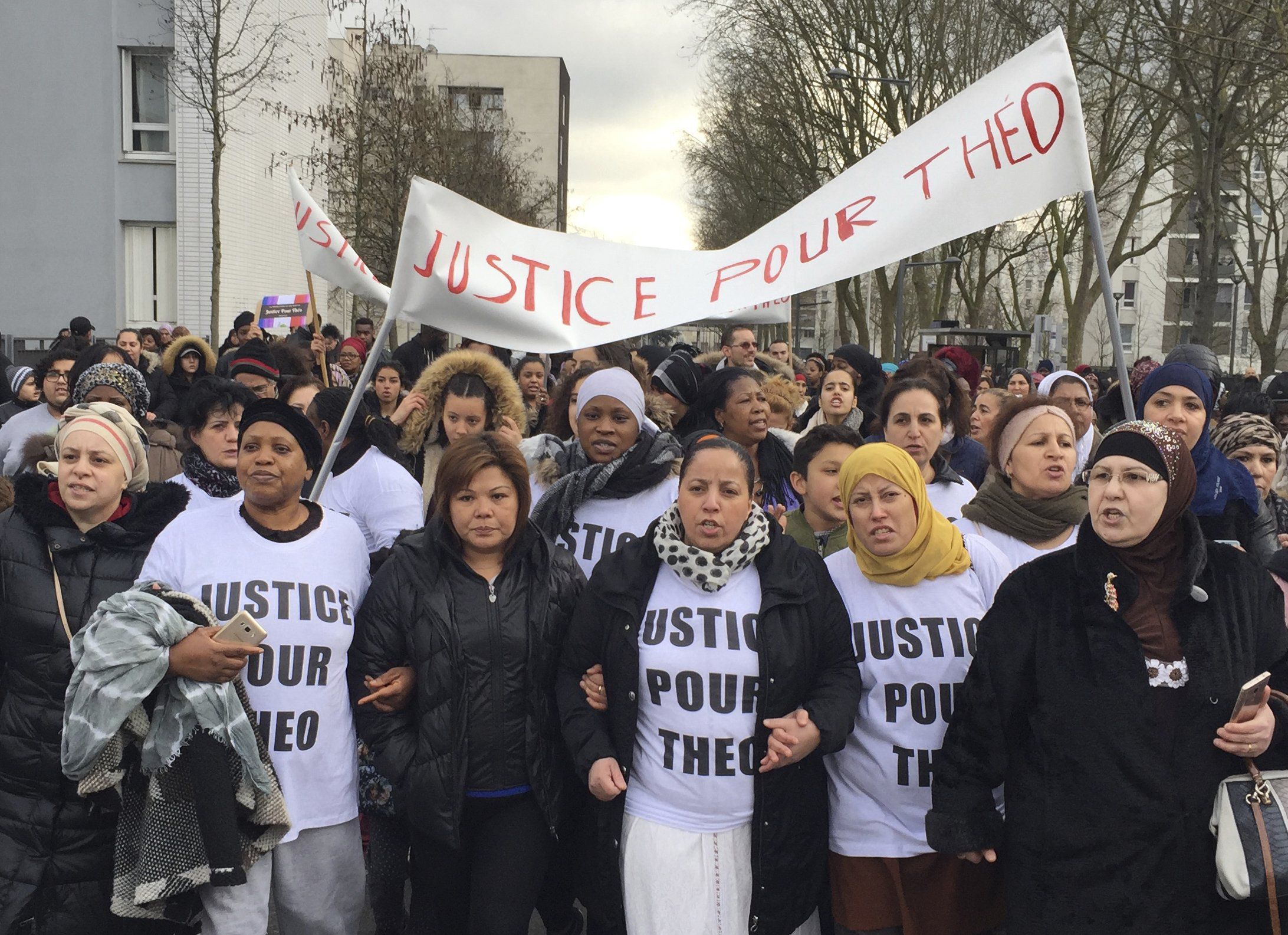
Against a background of years of racist police brutality, France has again experienced an uprising among black, Arab and Muslim youth. On 2 February 2017 four police officers arrived on a housing estate in Aulnay-sous-Bois, a Parisian ‘banlieue’ (suburban working class district) and started asking youths for identity papers. When one youth, identified subsequently only as ‘Théo’ refused, he was forced to the ground. He was then beaten while he had racist abuse hurled at him, and finally he was sodomised with a baton to such an extent that he had to have emergency surgery and stay in hospital for 60 days. The officer accused of rape claims that it was an ‘accident’ and all four contend that they stopped Théo because they thought he might be an illegal immigrant.
This is just the latest event in a long history. In 2005 people in French cities rose up in response to the deaths of Zyed Benna and Bouna Traoré at Clichy-sous-Bois, also in the Parisian banlieue. Zyed and Bouna had been playing football with friends and were returning home when they saw a police patrol. Knowing from experience the harassment and danger they were likely to face, the group decided to separate and hide. Zyed and Bouna were forced into an electricity substation where they died. The racist repression that the state meted out to those who rose up in resistance and to the black community in general was brutal. In one incident, police launched teargas into a mosque. In 2007, a police car rammed two teenagers, Moushin S and Larami S, off the road and killed them at Villiers-le-Bel. The memory of these events is still very much alive in the banlieue, as is the recent death of Adama Traoré at Beaumont-sur-Oise, around 40km from Paris. An all too familiar story; he was slammed to the floor and left in the prone position where he died. His family and friends continue to fight for justice, which, in another all-too-familiar story, is proving elusive as the racist French state refuses to punish its racist stormtroopers. Two inquests have turned up nothing and the state is harassing Traoré’s family, including repeatedly arresting his brothers.
Defiance against this continuing brutality has come to the surface following the attack against Théo. A delegation of local mothers marched on the police station and was received by the police superintendent. On 6 February, at least 500 (according to le Parisien) marched to the town hall demanding ‘Justice pour Théo!’. That night, cars and bins were burnt and the police made 24 arrests. A police helicopter circled the area. On a neighbouring estate bottles and other objects were thrown at the police. The rebellion has since spread into other parts of Paris and France. On 23 February students blockaded schools and colleges, started fires and clashed with police in protest. Some marched under a banner calling for ‘Vengeance pour Théo’. Around 1,000 rallied at Place de la Nation and there were 28 arrests. The state had CRS officers (riot police infamous in France for their brutal tactics) on standby. On 10 March police used teargas against around 150 students at Gustave-Eiffel and Maximilien-Sorre de Cachan schools in the Parisian banlieue. Eyewitnesses also claim that the police used rubber bullets.
The authorities have moved swiftly to try and control the situation. The officers were arrested and charged: one with rape and three with assault. President Hollande visited Théo in hospital on 7 February. Interior Minister Bruno Le Roux apologised for calling the events a ‘tragic accident’ and stressed his faith in ‘justice’. Education minister Najat Vallaud-Baelkacem launched an ‘appeal for calm’, stating that ‘there is an understandable emotion in the youth regarding this situation, but we must let justice work.’ Their words ring hollow as the ‘State of Emergency’, imposed in response to the Paris attacks of November 2015, continues to grant police extra powers to harass black people and Muslims and as the police who killed Adama Traoré, Zyed Benna, Bouna Traoré and many more remain at large.
This is the backdrop to a presidential election in which the leading candidate, polling at 27%, is the leader of the Front National, a Party which until recently was openly fascist. Significantly, a 2016 survey by CEVIPOF, the research centre on politics at Sciences Po University in Paris, found that 51.5% of police surveyed voted for the Front National in 2015, up from 30% in 2012. The police are an occupying force in the black community: and it is no surprise that the majority of this force, which exists to defend the interests of capital against its potential gravediggers, is voting fascist.
Seamus Padraic




